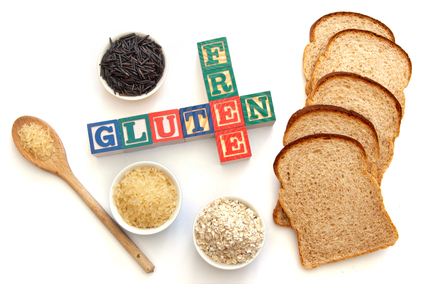Every time you go to the store, you probably see the headlines. Sandwiched between Hollywood love affairs and speculation of celebrity pregnancies are countless fad diets.
Every month they claim you can lose weight like the stars do. Maybe Renee Zellweger’s bizarre technique of eating ice to feel full is the answer! Probably not.
The Diet Equivalent of the Holy Grail
The majority of these diets are bogus – often dangerous – and for the most part, you ignore them. Then there are those moments when you pick one up. It could be curiosity about what those zany celebrities will do next. Perhaps it is hope that someone has found an answer to weight loss that will help you take off unwanted pounds and keep them off.
One that is worth a closer look are the advantages of a gluten-free diet. People diagnosed with celiac disease have an allergy to the gluten found in wheat, barley, and rye.
Reactions to these substances in food can range from mild intestinal distress to a life-threatening reaction.
The primary treatment for this condition is removing all gluten from your eating plan.
Removing grains from the individual’s diet allows them to live healthier lives without the chronic inflammation and side effects that are the trademark of celiac disease.
A Beneficial Side Effect of Gluten-Free Eating
The advantages of a gluten free diet to those with allergies to it are obvious. Researchers stumbled upon a previously unknown benefit during their clinical trials.
Restricting gluten can have a positive effect on patients with type 1 diabetes. Unlike type 2 diabetes, type 1 is not preventable and it is not reversible. Patients must carefully monitor their blood sugar to prevent drastic crashes and spikes. Not doing so can result in hospitalization and even death.
An animal-based study conducted at the prestigious Mayo Clinic proposed that eating gluten can increase your risk of diabetes. 
Other studies have produced similar results. Research at the London School of Medicine (funded by The Juvenile Diabetes Research Foundation) discovered a genetic link between people with a sensitivity to gluten and those with type 1 diabetes.
The scientists involved in the London study felt so strongly about their findings that they recommended individuals with celiac disease monitor their blood sugar levels regularly. They also recommended that diabetics watch for signs of gluten sensitivity.
What are signs of gluten sensitivity?
Digestive issues are the most common but not the only symptoms of a gluten allergy.
- Gas and bloating
- Diarrhea
- Constipation
- Fatigue
- Dizziness
- Anxiety and depression
- Migraine headaches
- Hormonal imbalances
If you suspect you may have gluten sensitivity, the surest test is an elimination diet you can conduct at home. Over a period of three to four weeks, eliminate all traces of gluten from your diet, no matter how slight.
Note any changes in how you feel overall and then slowly begin reintroducing foods.
If your symptoms reappear, you may have a gluten allergy.
Diabetes and celiac disease are autoimmune diseases. They cause inflammation, which leaves your body vulnerable to disease. Eating well and filling your plate with lean meats, fruits, and vegetables can reduce this inflammation and keep you healthier all around.
Avoid boxed and processed foods whenever possible. Oats, pasta, and beer are foods typically abundant in gluten although you may find gluten-free varieties.
Steel cut oats, gluten-free pasta (check those labels!), and sorghum beer are available so that you don’t have to give up the foods that you love. Your quality of life doesn’t have to change to avoid gluten.
One last word of caution: if you have type 1 diabetes and are considering removing gluten from your diet, remember that the use of products such as rice flours in gluten-free foods can cause unexpected spikes in your blood sugar. While adjusting to your new diet, make sure you monitor your carbohydrate intake a bit closer than usual.
For diabetics and celiacs, life is often about taking it day by day, if not meal-by-meal. For some people, the idea of combining both diagnoses may be frightening.
In truth, all you have to do is continue to do what you have always done, and even if you aren’t diabetic or don’t have a gluten allergy, the advantages of a gluten-free diet can be significant to your health. Decide if removing gluten from your diet is right for you!



